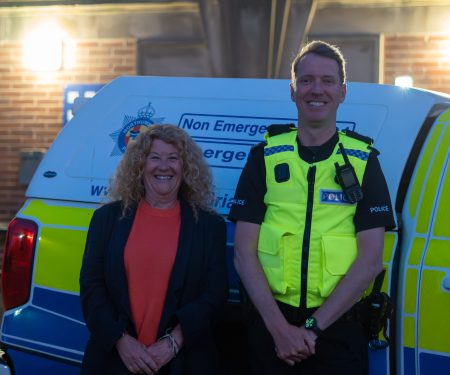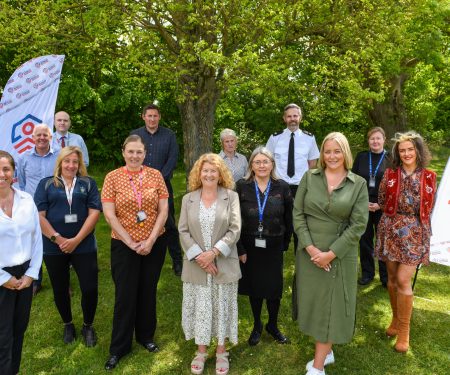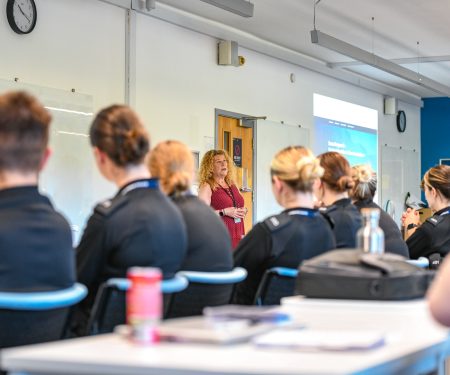
27th May 2025
Crime and ASB
PCC Susan Dungworth welcomes national funding boost to tackle rural crime

07761764406
enquiries@northumbria-pcc.gov.uk
Newcastle’s Safe Haven Van has a fresh new look and will be back parked up on the Bigg Market as a go-to safety spot for anyone feeling vulnerable when out in the city at night.
The Community Safety and Engagement Van, widely known as the Safe Haven, has had a welcome refurbishment thanks to £20K in funding made by Northumbria’s Police and Crime Commissioner Susan Dungworth. The investment is part of her commitment to delivering safer streets and stronger communities for the people of Northumbria.
A range of technical and aesthetic upgrades have been made to the van which is located at the heart of the Bigg Market. It is in situ from 10 pm to 4 am on Fridays and Saturdays, when footfall is at its highest.
The stand-out blue police vehicle is there to make sure help is at hand if you’ve lost your friends, need to charge your phone or wish to speak to an officer about any safety concerns you may have.
Provisions include a confidential space, medical supplies, information leaflets and phone charging facility and that safe space to talk to a Police Officer.
Police officers work closely with partners including NEAS, Newcastle City Council Street Marshals and Newcastle’s Street Pastors, who all come together to look offer help and support to revellers.
The recent investment also means that when the van is not in use on weekend nights, it will be put to good use as a police engagement resource, providing a base for officers to get out into local communities, ensuring both greater accessibility and visibility.
Northumbria Police and Crime Commissioner Susan Dungworth said: “The Safe Haven has been a familiar sight to people out in the city for years and since becoming PCC I have heard countless positive stories from police, door staff, the council and even party-goers themselves – thankful for the van and colleagues working together to look after people. Although hugely valued, it was long due an upgrade and so we have made it happen.
“If anyone needs assistance on a night out in the City Centre, the Safe Haven is there, as a help point, and I want to make sure it stands out and people know about it.
She added: “A key priority in my Police and Crime Plan is ensuring we have an engaged and responsive police force and the van puts officers alongside partners right there in the heart of the night-time economy. It’s there to make people feel safe and allow people to easily find and speak to an officer if they need to. On one hand it’s there for crime prevention, and on the other it helps address vulnerability and to support victims. So, whether you need advice or just a sit down somewhere safe, the van is there to welcome you.”
Northumbria Police’s Neighbourhood Inspector Karen Madge said: “This latest funding to re-launch the Safe Haven Van is very welcome as we continue to work hand-in-hand with our partners to keep people safe.
“By night, it becomes a vital space for those who may need help—whether that’s reporting something confidentially to the police, charging phones, finding a safe spot to sit and wait, or reconnecting with family and friends if you’re lost. We can help get you home safely, or support you in seeking medical attention via the treatment centre located next to us.
“And now I’m pleased to say these improvements mean that we’ll be expanding our deployments beyond the night-time economy, in addition to our normal patrol activity.
“Two officers are dedicated to working on the vehicle and are there for advice, support, can be spoken to in confidence. We are here to help.
“This is brilliant news and really supports our ability to engage with even more people across the city. Ultimately, we aim to be a safe space for everyone—and we’ll be there when they need us.”
ENDS
You can also have a read of our recent Newsletters

27th May 2025
Crime and ASB
PCC Susan Dungworth welcomes national funding boost to tackle rural crime

22nd May 2025
Crime and ASB

16th May 2025
Engaged and Responsive Police Force

27th May 2025
Crime and ASB
PCC Susan Dungworth welcomes national funding boost to tackle rural crime

22nd May 2025
Crime and ASB

16th May 2025
Engaged and Responsive Police Force

27th May 2025
Crime and ASB
PCC Susan Dungworth welcomes national funding boost to tackle rural crime

22nd May 2025
Crime and ASB

16th May 2025
Engaged and Responsive Police Force
Northumbria’s Police and Crime Commissioner, Susan Dungworth, has said additional funding has been secured to help protect children growing up with domestic abuse around them at home.
Today, Government announced £5.3 million for services supporting children affected by domestic abuse, within the Preventing Violence Against Women and Girls and Supporting Children (PVSC): Children Affected by Domestic Abuse (CADA) grant.
This means the Northumbria Police force area has an additional £178,976.94 of funding to deliver support locally to children and young people affected by domestic abuse. This brings the total level of CADA funding from 2022-2026 to £570,210.94, a 25% increase compared to the previous year’s funding.
Local services commissioned by the Office of the Police and Crime Commissioner include Acorns, Action for Children, the Angelou Centre, Community Counselling Cooperative, Impact Family Services and Wearside Women in Need.
These organisations will continue to offer a range of support from 1:1 counselling and group work, to play therapy and therapeutic support for children alongside their non-offending parent.
Last year, these organisations all exceeded their service targets and extended their service offer due to rising demands.
Altogether, 382 children were supported with 1:1 and group work sessions, 280 joint parent and child sessions were delivered, and 244 parents were involved in engagement work.
Northumbria Police and Crime Commissioner, Susan Dungworth, said: “It is so important that children grow up in a safe and stable environment. Sadly, not all do – so it’s vital they have somewhere to turn, especially those growing up in an environment where they’re exposed to stress, controlling behaviours and even violence. These children experience the domestic abuse and are very much the victims too.
“We know the damaging impact domestic abuse can have on the development of children and young people, so we need to do all we can to make sure they have access to the right support to help them cope with and overcome their experiences.
“Recent years have been a real struggle for services – they’ve been crying out for more funding to offer specialist support to children and feel it’s been more of an afterthought or an add on, yet it needs to be a priority area in its own right.
“They’ve been telling me demand keeps rising, but the money hasn’t been – so this latest funding boost really is a long due increase.
“I am thankful that we have a government who recognises this need and is taking steps to put this right. Of course, we need to keep pushing for more money, but it’s certainly a start and it all helps towards national targets set to halve VAWG over the next decade.
“I’m also particularly thankful to all our CADA services who, despite the financial challenges, have shown such commitment to supporting, advocating for and empowering the children they work with – they’ve been making a difference to so many lives.”
Tackling violence against women and girls (VAWG) is a priority in the PCC’s plan for safer streets and stronger communities. In both her Plan and VAWG Strategy she has outlined a commitment to ensuring all victims of domestic abuse have access to the best support services to meet their needs – and that includes children.
Maxine Tennet, from the Acorns Project, a specialist domestic abuse support service based in North Tyneside and Northumberland, said: “We are delighted at the increase in available funding. Especially as it acknowledges the urgent need to support child victims-survivors of domestic abuse.
“Children have been the hidden victims for so long, and this funding is a crucial next step in ensuring Acorns can continue providing specialist care and support to help them heal and thrive.”
More than 800,000 children in England and Wales are believed to be living in a home where a parent is enduring domestic abuse, according to a recent study.
Under the Domestic Abuse Act, children are classed as victims if they see, hear, or experience the effects of abuse and they are related to the victim or offender. More information on victim services commissioned by the Office of the Police and Crime Commissioner can be found here.
ENDS
PHOTO: Susan Dungworth at the Angelou Centre – one of the commissioned service providers
You can also have a read of our recent Newsletters

27th May 2025
Crime and ASB
PCC Susan Dungworth welcomes national funding boost to tackle rural crime

22nd May 2025
Crime and ASB

16th May 2025
Engaged and Responsive Police Force

27th May 2025
Crime and ASB
PCC Susan Dungworth welcomes national funding boost to tackle rural crime

22nd May 2025
Crime and ASB

16th May 2025
Engaged and Responsive Police Force

27th May 2025
Crime and ASB
PCC Susan Dungworth welcomes national funding boost to tackle rural crime

22nd May 2025
Crime and ASB

16th May 2025
Engaged and Responsive Police Force
The father of Alice Ruggles, who was murdered by an obsessive stalker in Gateshead in 2016, has bravely joined pupils at a Sunderland school to see how the charitable Trust, set up in her memory, is sharing Alice’s devastating story through a new schools initiative.
The school assemblies project, delivered by The Alice Ruggles Trust, is free to secondary schools across the Northumbria Police force area and aims to help prevent what happened to Alice from happening to others.
The scheme has been funded by Northumbria Police and Crime Commissioner, Susan Dungworth, who also joined Alice’s dad, Clive, to see the impactful assembly being delivered.
Students at Sandhill View Academy in Sunderland attended the 30-minute assembly, ahead of National Stalking Awareness Week (NSAW) 21-25 April. The school is one of 18 across the force area to have signed up for the assembly.
The Alice Ruggles Trust was set up by Alice’s loved ones to educate people around stalking, the potential risks of stalking, and what they can do about it.
Like many stalking victims, Alice did not realise the very real danger that she was in at the hands of her obsessive ex-partner. Nor was the danger fully recognised by her family, her friends or the police.
The project has therefore been designed to raise awareness of the fixated, obsessive, unwanted and repeated behaviours that can lead to stalking, and how to seek help. It is also focused on prevention and getting the message across to young people that they should seek support when patterns of repeated, unwanted behaviours make them feel uncomfortable and uneasy – so they can access support before behaviours become fixated and obsessive.
By the end of the assembly students should:
One young person said “I was shocked by what happened. It’s made me think about people’s behaviours, and my own too. Checking someone’s ‘last online’ or ‘current location’ – people can get obsessed – it can get out of hand.”
Northumbria Police and Crime Commissioner, Susan Dungworth, said:
“To be sat there, watching such a moving and powerful assembly being delivered, with Alice’s dad sat right next to me – it was incredibly poignant. I’m in awe with how the family have made it their mission to do everything in their power to help prevent what happened to Alice from happening to others.
“It’s really important, particularly in the digital age, that young people recognise stalking and have the confidence to seek support. By getting this assembly rolled out in as many schools as possible, in front of as many young people and their teachers as we can, I hope we are equipping this generation with the knowledge to recognise stalking, along with the confidence to seek help.”
Clive Ruggles of The Alice Ruggles Trust, said:
“The strapline of the Alice Ruggles Trust is ‘Putting an end to stalking’, and we believe the only way to approach that ultimate goal is to change the mindset of a generation. That is why we focus on educating young people, through assemblies like this, to recognise the seriousness of stalking, to look out for those around them, and know where to go to seek help. And an essential part of our strategy is to stop people becoming stalkers in the first place, by helping youngsters identify and tackle problem behaviours before they escalate.
“It never gets any easier to hear Alice’s voice as we play part of her phone call to the police, but sitting in front of the audience at one of our assemblies it was clear to see the impact that our message was having.
“We are hugely grateful for the support of the Northumbria Police and Crime Commissioner which has made it possible to reach so many schools in their area and has provided a model that we are starting to follow around the country. Stalking is shockingly widespread and stalking awareness is an essential part of relationships and sex education. We hope that many of the schools we reach with our assemblies will follow up with our PSHE lessons that are freely available on-line to all teachers.”
Assistant Headteacher Anthony Blake at Sandhill View Academy in Sunderland, said:
“We place great importance on educating our students about healthy relationships and how to stay safe. Hearing Alice’s harrowing story and the impact on her family members really personalised this. We could see the key messages unfold and resonate with students; the dangers of normalising controlling behaviours such as checking people’s locations, ‘last online’ status and understanding when behaviours or attentions are unwanted.
“It was also important for students to learn that anyone can become a victim and where to seek support. These powerful messages were delivered clearly through the assembly, through the support of the Alice Ruggles Trust and reiterated through the conversations that followed.
“We value the strong links we have with our neighbourhood policing team to ensure we are able to work together to support our students and the wider community. This collaboration is essential to keep our students safe along with the other networks of support available.”
Eighteen schools across the region have already signed up to the project, with 13 assemblies delivered to date. To arrange an assembly or learn more about how to volunteer with this vital initiative, contact Lydia at The Alice Ruggles Trust lydia@alicerugglestrust.org

ENDS
Notes to editors
National Stalking and Awareness Week 2025 runs from April 22 – 25.
For support or advice on stalking, please visit: Stalking and harassment | Northumbria Police
You can also report anonymously using Crimestoppers or visit a local police station. For those unable to contact police in this way, call 101.
In an emergency, or if a crime is taking place, always call 999.
Support agencies who work in the Northumbria area:
For further advice visit:
You can also have a read of our recent Newsletters

27th May 2025
Crime and ASB
PCC Susan Dungworth welcomes national funding boost to tackle rural crime

22nd May 2025
Crime and ASB

16th May 2025
Engaged and Responsive Police Force

27th May 2025
Crime and ASB
PCC Susan Dungworth welcomes national funding boost to tackle rural crime

22nd May 2025
Crime and ASB

16th May 2025
Engaged and Responsive Police Force

27th May 2025
Crime and ASB
PCC Susan Dungworth welcomes national funding boost to tackle rural crime

22nd May 2025
Crime and ASB

16th May 2025
Engaged and Responsive Police Force
AN innovative partnership that aims to tackle staking behaviours and prevent reoffending has worked on 43 high risk stalking cases in its first year.
The Northumbria Stalking Interventions Programme (NSIP) brings together police, probation, victim services and health professionals to raise awareness of stalking among colleagues, better manage the risk of those exhibiting stalking behaviours and ensure victims are offered the best protection and support.
The project became operational in 2024, with funding secured through the local Probation Service and the Office of the Police and Crime Commissioner for Northumbria.
In the project’s first year, the key focus has been training practitioners to recognise early signs of stalking behaviours and ensuring stalking-specific risk assessments are carried out for high-risk cases. NSIP has developed and delivered a stalking awareness package to 2332 practitioners throughout probation as well as other partner agencies within the Northumbria force area.
Another part of the project is provided by CNTW who help risk assess the cases of highest concern and advise on risk and safeguarding. Expertise includes the advice from forensic psychiatrists and psychologists who assist other agencies in comprehensively understanding the risks presented and advice on management strategies aimed at protecting the victims and the general public.
Crucially, alongside all this work, the project also ensures all agencies are communicating to ensure victims access specialist emotional support and safeguarding advice through Paladin National Stalking Advocacy Service and Northumbria Victim and Witness Service (NVWS). Together they have supported 26 people through NSIP.
Examples of behaviours of perpetrators referred to the programme include making threats, tracking victim whereabouts (often online), making unwanted contact, breaching restraining orders, turning up at a victim’s home or a children’s school and other behaviours.
Of the 43 individuals successfully referred onto the programme, the most common relationship between perpetrator and victim was ex-intimate partner (81.4%), and of the 43 referrals, 42 were male.
Project successes to date include influencing court disposals and assessments, arrests for the most concerning stalking perpetrators, enhancing safeguarding and support to victims, increasing information sharing between partners, victims having increased feelings of safety, and there are early indicators of reduced harm to identified victims and future victims through action taken.
The Northumbria Stalking Interventions Programme (NSIP) is a multi-agency project involving collaboration between partners from the Probation Service, Northumbria Police, Cumbria, Northumberland, Tyne and Wear NHS Foundation Trust (CNTW), the Office of the Northumbria Police and Crime Commissioner (PCC), Northumbria Violence Reduction Unit, Paladin National Stalking Advocacy Service, Northumbria Victim and Witness Service and the Alice Ruggles Trust.
Northumbria Police and Crime Commissioner, Susan Dungworth, said:
“Stalking is a very frightening and intimidating crime and the earlier we can all come together to protect the victim and change the behaviours of those doing the stalking, the better. We call this a multiagency approach, and I really believe it’s the best way to address stalking by ensuring effective communication and information sharing.
“Tackling Violence Against Women and Girls in all its forms is very much a priority of my Police and Crime Plan. We know stalking remains an under-reported crime and I want to make victims feel empowered to speak up and report it. I want to highlight this programme, so people know stalking is something we’re taking seriously whether that’s improving the policing response or working to change perpetrator behaviours. This programme is presenting a real opportunity to reduce offending, while supporting victims and improving their overall experience of the criminal justice system.
The PCC added: “Fortunately we have a government that’s taking stalking seriously too, looking to introduce new measures to strengthen enforcement and better protect victims, such as making it easier for courts to issue Stalking Protection Orders and improving information sharing with victims. I believe these new measures will make it easier to protect victims and hold perpetrators to account. These are meaningful changes that will help us tackle stalking head on.”
Paul Weatherstone, Head of Newcastle upon Tyne Probation Delivery Unit, said:
“We know that stalking causes significant harm and distress to those involved and the best way to tackle it effectively is by organisations working together to hold the perpetrator to account and promote behaviour change while also making sure that the victim is kept safe.
“As the Probation lead for the Northumbria Stalking Interventions Programme I am really proud of all that we’ve achieved to upskill literally hundreds of Probation staff across the North East Region to better recognise, assess and address the risks associated with stalking. I’m also really proud of the central role that Probation has played in establishing this important multi agency approach to address an issue of increasing concern.
“By working collaboratively we’ve already been able to deliver some really positive change about the way we work with stalking. Looking ahead, it’s crucial that we build on what we’ve achieved so far and continue to work together to better protect victims and make our community safer.
Dr Rajesh Nadkarni, Executive Medical Director and Deputy Chief Executive for Cumbria, Northumberland, Tyne and Wear NHS Foundation Trust (CNTW), said:
“We have a long history of working in partnership with police, probation, courts, and other agencies. This includes providing clinical advice, training, and working strategically with our partners. Stalking and associated behaviours cause significant harm and distress to those involved and often needs a multiagency management response. The Northumbria Stalking Interventions Programme has formally brought together much of this work and expanded the team of people and resources dedicated to it. We are delighted to provide specialist expertise to this programme and, with our partners, continue to strive to make our communities safer.”
Chief Operating Officer, Louise from Paladin NSAS, said:
“A member of our team sits within the clinic meetings and discusses the weekly referrals to ensure the victim’s voice is considered, support offered and to highlight the lifelong impact that stalking has on victims. The NSIP is a positive step forward for the area to improve the response to stalking across the local criminal justice system, with the aim to better identify, support and protect victims of stalking and effectively manage stalking offenders.”
Clive Ruggles, The Alice Ruggles Trust, said:
“Stalking is a hideous form of abuse that can take many forms but always involves unwanted intrusions into people’s lives, repeated endlessly, leaving victims in despair and distress and often in fear of their lives. In the worst cases this fear is justified, as I know all too well following the murder of my daughter Alice in Gateshead back in 2016.
“Stalking is shockingly widespread and cases, when they come to the attention of criminal justice or healthcare professionals, are all too often inadequately dealt with. This is why projects such as NSIP, which brings together a range of agencies to mitigate the risk to stalking victims and help them navigate a way forward, are so vital.
“In the Alice Ruggles Trust we believe that the only way to tackle the problem in the longer term is to change the mindset of a generation, which is why we focus on educating young people to recognise the seriousness of stalking, to look out for those around them, and know where to go to seek help. And an essential part of our strategy is to stop people becoming stalkers in the first place, by helping youngsters identify and tackle problem behaviours before they escalate.
“We are proud to be part of the NSIP project, which ties together these approaches, and are confident it will help lead the way to a future with far fewer stalking victims and adequate protection and support for those who do remain. The ultimate goal has to be to bring stalking to an end, and we can only do that by working together.”
Assistant Chief Constable Alastair Simpson, of Northumbria Police, said: “Stalking is a crime which sadly can often have a lifelong impact upon victims.
“Since it was launched last year, the Northumbria Stalking Intervention Programme (NSIP) has been making steady progress in assessing the highest risk offenders – before intervening and diverting them away from stalking behaviours through agency appropriate management and referrals.
“The initiative also seeks to further equip specialists across the multitude of agencies involved in NSIP with the tools to increase their knowledge, understanding and confidence when identifying and dealing with stalking.
“As a Force, we are supportive of the collaborative and innovative approach by joining agencies together in the pursuit of perpetrators and the safeguarding and protection of vulnerable victims.”

You can also have a read of our recent Newsletters

27th May 2025
Crime and ASB
PCC Susan Dungworth welcomes national funding boost to tackle rural crime

22nd May 2025
Crime and ASB

16th May 2025
Engaged and Responsive Police Force

27th May 2025
Crime and ASB
PCC Susan Dungworth welcomes national funding boost to tackle rural crime

22nd May 2025
Crime and ASB

16th May 2025
Engaged and Responsive Police Force

27th May 2025
Crime and ASB
PCC Susan Dungworth welcomes national funding boost to tackle rural crime

22nd May 2025
Crime and ASB

16th May 2025
Engaged and Responsive Police Force
Ways to get in touch